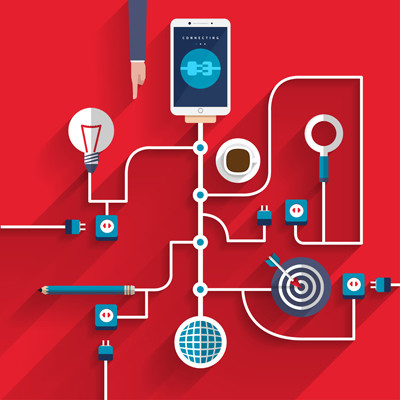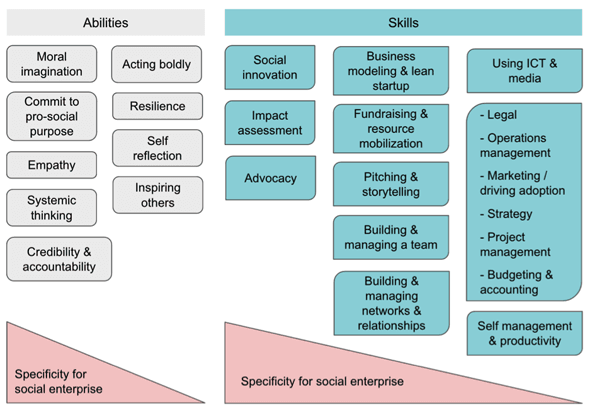What critical skills and abilities do business school students need to become effective social impact leaders? As social impact educators responsible for preparing students to make a difference through their work, this is one the most important questions we can ask. Many social innovation programs focus on developing the competencies a founder needs to start a business. But students looking to take on a social impact leadership role—beyond the founder seat—need a broader set of skills and abilities to be successful. How do we define those competencies and help our students develop them?
At the DO School, which offers experiential learning programs centered on business and social impact, I developed and directed a blended learning start-up course for social entrepreneurs called the Venture Lab. This work highlighted participants’ need to develop a broader set of competencies than those required in the founder role, and this past year, I lead a study for Saïd Business School’s Skoll Centre for Social Entrepreneurship to explore these core competencies in more detail.

I looked at 39 global programs, massively open online courses (MOOCs), and other online resource collections for social entrepreneurs to identify the range of skills and abilities education programs are focusing on—and not focusing on. While the divide between skills and abilities is not clear-cut, for the purposes of this discussion, we can distinguish them by imagining a person who has learned how to apply IDEO’s Human-Centered Design Toolkit (a knowledge-based skill set) versus one who can empathize with others (an emotional ability).
The image below is my summary of the competencies social impact education currently considers relevant. Whereas students often learn skills (blue) in the classroom, they need to discover and build abilities (gray) through practical experience, and ideally coaching and guided reflection.
 An overview of the abilities and skills social impact leaders need.
An overview of the abilities and skills social impact leaders need.
The majority of programs I reviewed focused overwhelmingly on teaching skills, versus helping students discover and build their abilities. This is concerning, given that abilities like self-reflection, empathy, boldness, and resilience are required to turn theoretical knowledge into practically applicable competencies. Only when we try, fail, try again, and reflect on our experience of applying theoretical knowledge to a real-world problem do we build competencies from what we learned in a course or workshop.
Zooming in on skill education, I found that many social impact courses and incubator programs offer little more than classic entrepreneurship instruction—pitching, fundraising, business modelling, and strategy—with a sprinkling of social innovation or impact assessment. Of course, these classic entrepreneurial skills are essential for social and traditional entrepreneurs alike, but there is room to connect them more clearly to the social impact field and to foster skills that can serve a range of social impact leadership roles.
In commissioning this study, the Skoll Centre team was explicitly interested in identifying courses that featured the competencies required to lead collective impact efforts—initiatives that help leaders build and manage networks of different organizations tackling the same issue. Those collaboration-oriented skills, as well as abilities related to learning about and understanding the root causes of an issue, were almost entirely missing from the curricula I reviewed.
An example
To illustrate my point, I would like to introduce you to Christine, one of the social entrepreneurs who participated in the DO School's Entrepreneurship for Good Program in Germany. Christine was initially selected for the program based on her idea of opening a package-free supermarket in the San Francisco Bay Area. Living package-free was an interest of hers, and news reports about bulk supermarkets around the world had come in handy when she was compiling her fellowship application. But a full-time job at Cisco was waiting for her after her return from Germany, and after a couple of one-on-one coaching sessions, she realized she was not yet ready to commit to opening her own store. Unsuccessful by classic “heropreneur” standards, but clearer about her values and commitment to diving deeper into zero waste, Christine left the DO School with an idea for a wider life journey, rather than a concrete business plan.
Her continued “apprenticeship with” the problem of waste led to a simple and very personal blog about zero waste, and how others could simplify their life through things like avoiding food waste or rethinking their bathroom routine. Having built some subject knowledge and credibility through research and regular blogging, she soon reached out to other zero-waste bloggers and started speaking at sustainability events. Moreover, she brought her knowledge and experience to bear on her relationships and activities at work—for example, discussing the wasteful contents of her official welcome package, sharing her ideas with co-workers, and advising on how to avoid waste in different areas of the business. Today, Christine is the sustainable packaging program manager at Cisco and is taking on the role of an “intrapreneur”—someone who creates social impact from the inside-out.
Christine's story shows that social impact through business can emerge from setting aside the idealized prospect of founding a new venture, and instead learning to value one’s unique personal contributions and competencies, in part through individual coaching.
What can social impact educators learn from this?
Based on this review and my own experiences in social entrepreneurship incubation at the DO School, I believe mainstream and early-stage social entrepreneurship education programs are too oriented toward short-term outputs and have opportunities for improvement. In particular, educators might consider:
- Developing their ability to individually coach program participants over longer time periods of time and build programs that allow for this. Coaching supports reflection on values, life goals, and motivation for entering the social impact field, and has the potential to heighten students' ability to act boldly, find their path, and develop resilience.
- Allowing students to “apprentice with” a problem instead of pushing them to develop quick-fix solutions. With this we mean encouraging them to get deeply inside and even “live” the issue they strive to address. Support them in experimenting and prototyping to identify leverage points, and build credibility grounded in a deep and systemic understanding that might lead to impactful solutions.
- Linking social impact education to existing advocacy efforts and a range of actors from different fields. Students should be allowed to learn about and contribute to the wider field of change agents working on a social issue: activists and movements, government initiatives, and even corporations, who are all needed to create systemic change. Such exposure will allow for a broader perspective on possible personal journeys toward social impact.
- Developing more fine-grained output and outcome indicators to track program success. Not everyone who starts their own project is a success and not every participant who chooses a mainstream corporate role has failed in their pursuit of impact. By expanding the goals of our programs beyond startup creation, we might end up with more Christines.
- Unleashing the potential for deep exchanges and mutual learning among program participants. Peer-to-peer coaching and group processes (such as coaching circles or action learning sets) are especially effective for the kinds of diverse groups I worked with at the DO School. They also help provide context and issue-based learning to candidates who previously had only academic exposure to a social issue but take interest in the idea of becoming social entrepreneurs.
Making these changes will enable educators to build high-impact and personally meaningful programs that have the potential to positively shape the life journeys of the next generation of social impact leaders—be they entrepreneurs, intrapreneurs, or amazing team members.
Support SSIR’s coverage of cross-sector solutions to global challenges.
Help us further the reach of innovative ideas. Donate today.
Read more stories by Romy Kraemer.

